Las Letras del Rock, bienvenidos. Hoy haremos un oscuro viaje dentro de la letra de la canción Uno de Metallica.Un gran saludo a todos los que se detienen a leer esta publicación. Yo soy @gatubela y esto se llama
The Lyrics of Rock, welcome. Today we will take a dark journey into the lyrics of the song One by Metallica.A big hello to all who stop to read this post. I am @gatubela and this is called
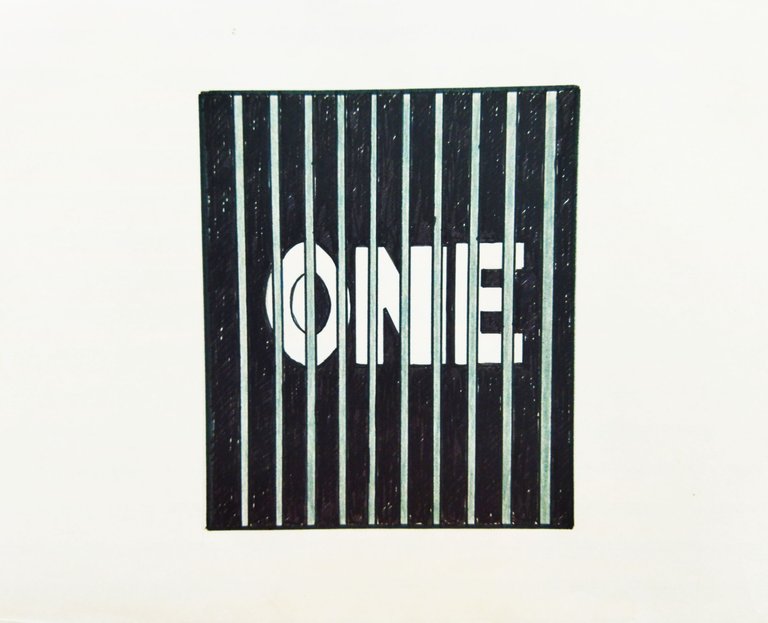
Metallica es una banda estadounidense de thrash metal fundada en el año 1981 en Los Angeles, California por James Hetfield (guitarra y voz) y Lars Ulrich (batería), a ellos se unirían Dave Mustaine (guitarra) y Ron McGovney (bajo). Al poco tiempo, Ron decide abandonar el grupo ya que no soporta a Mustaine y a su vez, Mustaine es despedido debido a su fuerte adicción al alcohol y comportamiento violento. Los sustituirían Kirk Hammet en la guitarra y Cliff Burton en el bajo. Con la entrada de Burton a la banda en 1982, Metallica se muda a San Francisco. En 1986 y mientras estaban de gira por Europa, Cliff fallece en Suecia al volcarse el autobús de gira del grupo y aplastarlo. Sólo tenía 24 años. Su lugar fue ocupado por Jason Newsted quien estuvo en la banda desde 1986 hasta el 2001. Desde el año 2003 el bajo está en manos de Robert Trujillo.
Metallica is an American thrash metal band founded in 1981 in Los Angeles, California by James Hetfield (guitar and vocals) and Lars Ulrich (drums), they were joined by Dave Mustaine (guitar) and Ron McGovney (bass). Soon after, Ron decides to leave the group since he can't stand Mustaine and at the same time, Mustaine is fired due to his strong addiction to alcohol and his violent behavior. They would be replaced by Kirk Hammet on guitar and Cliff Burton on bass. With Burton joining the band in 1982, Metallica moved to San Francisco. In 1986 and while they were touring Europe, Cliff died in Sweden when the group's tour bus overturned and crushed him. He was only 24 years old. His place was taken by Jason Newsted who was in the band from 1986 to 2001. Since 2003 the bass is in the hands of Robert Trujillo.
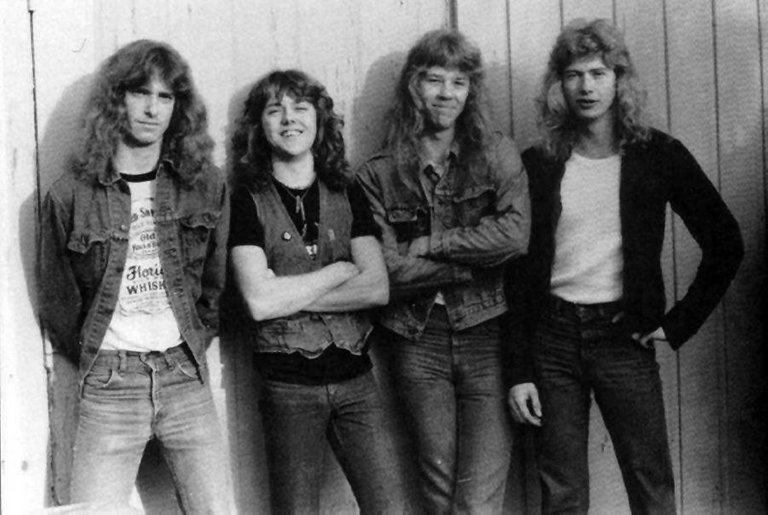
Metallica es reconocida como una de las mejores bandas de rock todos los tiempos gracias a su potente música, magistrales solos de guitarra y a la característica y agresiva forma de cantar de Hetfield. Desde su aparición ha sido una gran influencia para muchos grupos que emergieron posteriormente y aunque su música ha ido cambiando y evolucionando con el tiempo, algo que no le ha gustado mucho a los fans más acérrimos, no han dudado en explorar nuevos espacios, siempre enmarcados en el sonido del rock, por supuesto. La canción de la que les hablaré hoy, Uno, supuso grandes novedades para Metallica y fue el inicio de una larga lista de éxitos.
Metallica is recognized as one of the greatest rock bands of all time thanks to its powerful music, masterful guitar solos, and Hetfield's characteristically aggressive singing style. Since its appearance it has been a great influence for many groups that emerged later and although their music has been changing and evolving over time, something that the most staunch fans haven´t liked very much, they haven´t hesitated to explore new spaces, always framed in the sound of rock, of course. The song I'm going to talk about today, One, brought great novelties for Metallica and was the start of a long list of hits.
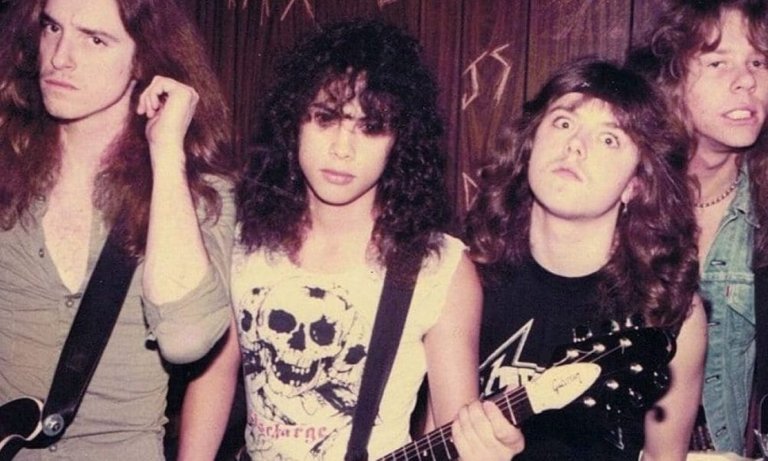
Uno está incluida en el cuarto disco del grupo, …And Justice for All, grabado entre el 28 de Enero y el 1 de Mayo de 1988 en los estudios One on One Recordings de Los Ángeles, fue producido por Metallica y Flemming Rasmussen y publicado el 7 de Septiembre de ese mismo año bajo el sello discográfico Elektra Records. Uno es la cuarta canción del album y fue el tercer y último sencillo promocional del disco, siendo lanzado en las emisoras de radio el 10 de Enero de 1989. Debido a su larga duración, 7:24 minutos, se hizo una versión más corta de 5:02 minutos para la radio.
One is included on the group's fourth album, …And Justice for All, recorded between January 28th and May 1st, 1988 at One on One Recordings in Los Angeles, it was produced by Metallica and Flemming Rasmussen and published on September 7th of that same year under the record label Elektra Records. One is the fourth song of the record and was the third and last promotional single from the album, being released on radio stations on January 10th, 1989. Due to its long duration, 7:24 minutes, a shorter version of 5:02 minutes was made for Radio.
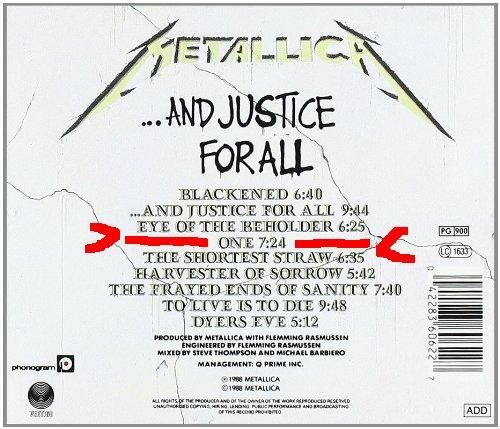
Escuchar Uno, es adentrarse en una oscura atmósfera musical. La canción es una declaración anti-bélica, centrada en un hombre victima de la guerra. La guerra es uno de los acontecimientos más violentos que un ser humano puede experimentar. El dolor, el miedo, el odio, la destrucción, la venganza, la muerte. Todo lo que puede dañar física, emocional, mental y espiritualmente a alguien está contenido en la guerra. La guerra es un mal que solo deja pérdidas y oscuridad. Independientemente de los objetivos que una guerra persiga, que de hecho ya nada tienen que ver con liberar a los pueblos sino con los intereses económicos, la guerra tiene un compañero inseparable, el horror. La verdad es que no es nada raro encontrar canciones de rock que hablen sobre la guerra pero ¿qué inspiró a Metallica a escribir una canción anti-bélica? Bueno, vayamos al origen.
Listening to One, is to enter into a dark musical atmosphere. The song is an anti-war statement, centering on a man who is a victim of war. War is one of the most violent events that a human being can experience. The pain, the fear, the hate, the destruction, the revenge, the death. Anything that can harm someone physically, emotionally, mentally, and spiritually is contained in war. War is an evil that leaves only loss and darkness. Regardless of the objectives that a war pursues, which in fact nowadays have nothing to do with liberating peoples but with economic interests, war has an inseparable companion, horror. The truth is that it´s not uncommon to find rock songs that talk about war, but, what inspired Metallica to write an anti-war song? Well, let's go to the origin.

California, entre finales de los años´60 y principios de los ´70, James Hetfield es un niño, el mayor de sus dos medio hermanos, David Hale, está leyendo un libro, el pequeño James le pregunta sobre ese libro y su hermano empieza a contarle que trata sobre un hombre que perdió sus piernas y brazos y que es sordo y ciego. James todo asustado le pregunta que entonces cómo hace ese hombre para comer, hablar, moverse y comunicarse, a lo que su hermano le responde que no lo hace porque aunque está vivo, no sabe como decirles que lo está. James recuerda que fue un gran impacto para él escuchar esa historia siendo apenas un niño pequeño y que en su momento le produjo mucha emoción pero sobre todo mucho miedo. Ese libro era “Johnny tomó su fusil” del escritor estadounidense Dalton Trumbo. Años más tarde, el co-mánager de la banda, Cliff Burnstein, le recomendó a Hetfield que leyera el libro para que de esta manera pudiera desarrollar mejor la idea que le había quedado de lo que su hermano le contó siendo un niño y que quería usarla para escribir una canción.
California, between the late '60s and early '70s, James Hetfield is a boy, the older of his two half-brothers, David Hale, is reading a book, little James asks him about that book and his brother starts to tell him that it´s about a man who lost his legs and arms and is deaf and blind. James all scared asks him how does that man eat, talk, move and communicate, to which his brother replies that he doesn't because even though he is alive, he doesn't know how to tell them that he is. James remembers that it was a great impact for him to hear that story when he was just a little boy and that at the time it caused him a lot of emotion but above all a lot of fear. That book was “Johnny got his gun” by the American writer Dalton Trumbo. Years later, the band's co-manager, Cliff Burnstein, recommended Hetfield to read the book so that in this way he could better develop the idea that he had left of what his brother told him as a child and that he wanted to use it to write a song.
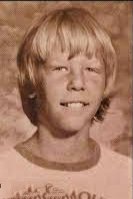
En esta novela anti-bélica, publicada en 1939, un joven soldado de la I Guerra Mundial pierde sus piernas y brazos al pisar una mina, como si eso no fuera suficiente, queda ciego, sordo y mudo, viéndose atrapado en un cuerpo inservible donde sólo su mente permanece activa para torturarlo. Trumbo se inspiró para escribir esta novela en un artículo que leyó sobre la visita del Príncipe de Gales a un hospital para veteranos canadienses de la Primera Guerra Mundial, donde acudió para ver a un soldado que había perdido sus cuatro extremidades así como todos sus sentidos. El libro ganó el Premio Nacional del Libro como el más original de ese año.
In this anti-war novel, published in 1939, a young World War I soldier loses his legs and arms when he steps on a mine, as if that were not enough, he becomes blind, deaf and mute, finding himself trapped in a useless body where only his mind remains active to torture him. Trumbo was inspired to write this novel by an article he read about the Prince of Wales's visit to a hospital for Canadian veterans of World War I, where he went to see a soldier who had lost all four of his limbs as well as all of his senses. The book won the National Book Award for Most Original that year.
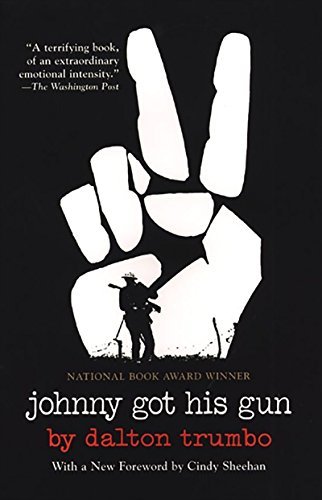
Luego de la trágica y desafortunada muerte de Cliff Burton, el resto de los integrantes quedaron muy afectados y esa energía oscura y pesada quedaría magistralmente reflejada tanto en las letras como en la música de …And Justice for All. Censura, guerra, injusticias judiciales y políticas, son la principal inspiración de este disco donde Metallica llevó al extremo la dureza de su thrash metal, creando un complejo sonido que a veces pareciera rozar el rock progresivo. Hetfield se concentró mucho en las letras de este disco, su intención era gritar al mundo lo que estaba pasando, la gran crisis moral y económica por la que atravesaba su país durante la década de los 80 y así, de alguna manera lograr una reacción por parte de la juventud.
After the tragic and unfortunate death of Cliff Burton, the rest of the members were very affected and that dark and heavy energy would be masterfully reflected in both the lyrics and the music of …And Justice for All. Censorship, war, judicial and political injustices, are the main inspiration of this album where Metallica took the harshness of their thrash metal to the extreme, creating a complex sound that sometimes seems to border on progressive rock. Hetfield concentrated a lot on the lyrics of this album, his intention was to shout to the world what was happening, the great moral and economic crisis that his country was going through during the 80's and thus, somehow achieve a reaction by part of the youth.
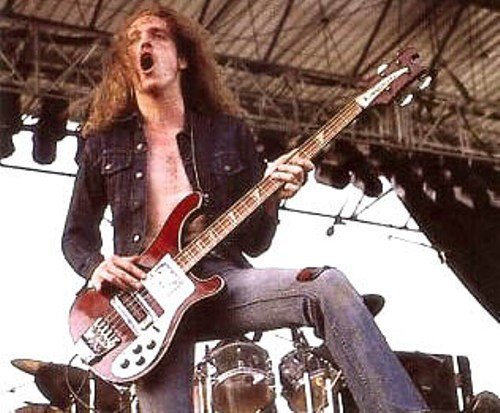
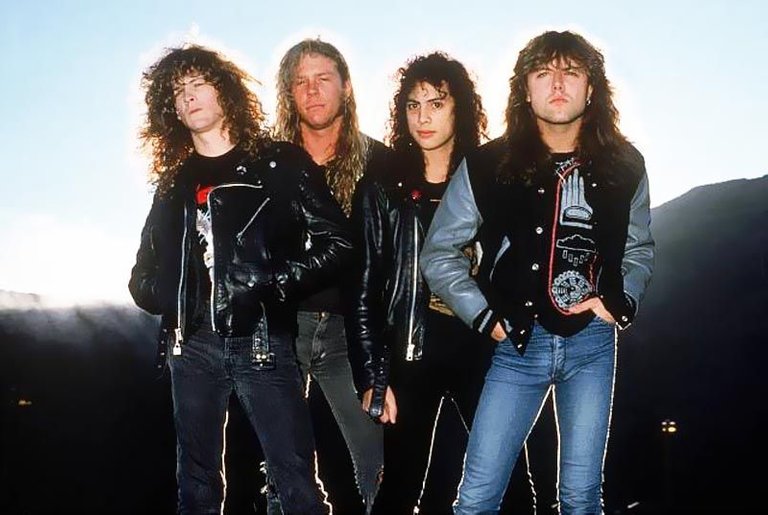
El título de Uno proviene también del libro de “Johnny tomó su fusil”, el mismo hace alegoría a las probabilidades de ser ese uno en un millón que va a ganar la lotería o que le pueda pasar algo, ya sea muy bueno o muy malo, el protagonista de la historia lamenta su mala suerte que lo ha llevado a ser esa mínima probabilidad que nadie quiere ser, un extracto del libro dice: “¿Cómo puede un hombre perder tanto de sí mismo como yo y seguir viviendo? Cuando un hombre compra un billete de lotería, nunca esperas que gane porque es una posibilidad entre un millón, Pero si gana, te lo crees porque uno entre un millón sigue siendo uno. Si leyera sobre un tipo como yo en el periódico no me lo creería, porque es una posibilidad entre un millón. Pero de un millón a uno siempre queda uno. Nunca esperaría que me pasara a mí porque las probabilidades de que ocurra son de un millón a una, pero de un millón a uno siempre queda uno”.
The title of One also comes from the book "Johnny got his gun", it allegories the chances of being that one in a million who is going to win the lottery or that something could happen to him, either very good or very bad, the protagonist of the story regrets his bad luck that has led him to be that minimum probability that nobody wants to be, an excerpt from the book says: "How can a man lose as much of himself as I do and go on living? When a man buys a lottery ticket, you never expect him to win because It's a one in a million chance. But if he wins, you'll believe it because one in a million is still one. If I read about a guy like me in the newspaper I wouldn't believe it, because it's a one in a million chance. But from a million to one there is always one. I would never expect it to happen to me because the odds of it happening are a million to one, but from a million to one there is always one.”

Uno es una canción compleja, llena de matices, momentos oscuros y agresivos pero también momentos de calma y serenidad, la letra se refleja en la música y viceversa, mientras más oscura se torna la letra más pesada se vuelve la música y mientras más triste y reflexiva se hace la narración la música baja sus decibeles, destacando las dulces y melódicas notas de la guitarra de Kirk Hammet. Se escuchan voces y sonidos de un campo de batalla, luego la canción empieza con unos suaves acordes de guitarra que llegan un poco a evocar una melodía renacentista, la batería, tímida aún, la va acompañando con algunos toques mientras James empieza a cantar en primera persona. La canción cambia de tempo cuando empieza el coro y todo se torna más pesado. Poco después de la mitad de la canción, y luego de una corta pausa donde solo se escuchan los bombos de Ulrich, llega el caos, la batería va anunciando el horror, los instrumentos se transforman en armas y empiezan a simular sonidos de ametralladoras mientras Hetfield, con sus característicos gritos, canta los pasajes más oscuros de la letra. El infierno se ha desatado. Las guitarras pesadas y la batería van guiando el frenético ritmo, el cual llega a otro nivel cuando aparece Hammet y hace uno de sus más famosos solos de guitarra, considerado por la revista Guitar World como el número 7 entre los mejores solos de la historia. Todo termina con unos últimos golpes de batería. Una canción magistral.
One is a complex song, full of nuances, dark and aggressive moments but also moments of calm and serenity, the lyrics are reflected in the music and vice versa, the darker the lyrics become, the heavier the music becomes and the sadder and more reflective the narration becomes, the music lowers its decibels, highlighting the sweet and melodic notes of Kirk Hammet's guitar. Voices and sounds of a battlefield are heard in the background, then the song begins with some soft guitar chords that come to evoke a bit of a Renaissance melody, the battery, still shy, accompanies it with some touches while James begins to sing in the first person. The song changes tempo when the chorus starts and everything gets heavier. Shortly after the middle of the song, and after a short pause where only Ulrich's drums are heard, chaos ensues, the drums announce the horror, the instruments transform into weapons and begin to simulate machine gun sounds while Hetfield, with his characteristic screams, sings the darkest passages of the lyrics. Hell has broken loose. Heavy guitars and drums guide the frenetic rhythm, which reaches another level when Hammet appears and makes one of his most famous guitar solos, considered by Guitar World magazine as number 7 among the best solos of the history. It all ends with a few last drum beats. A master song.
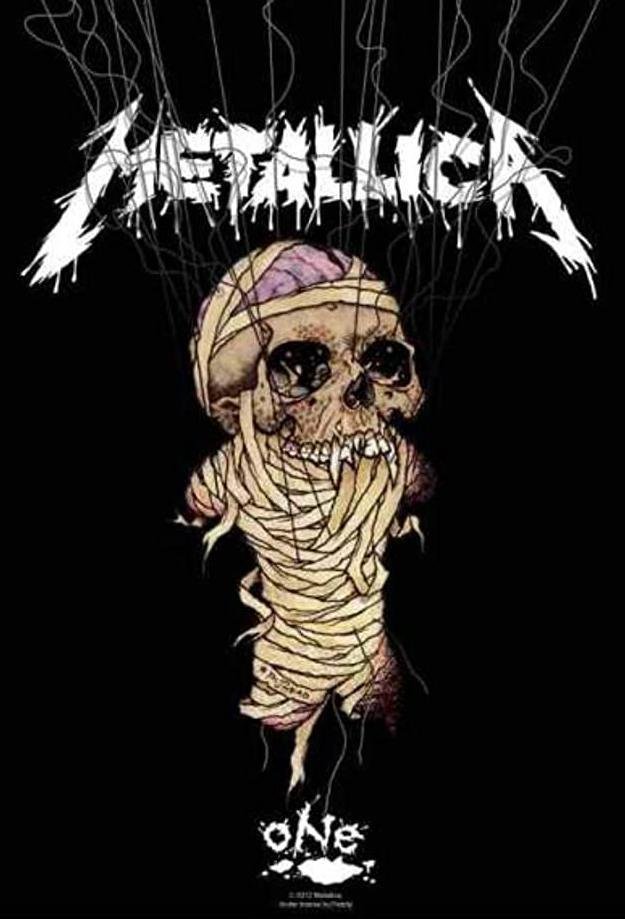
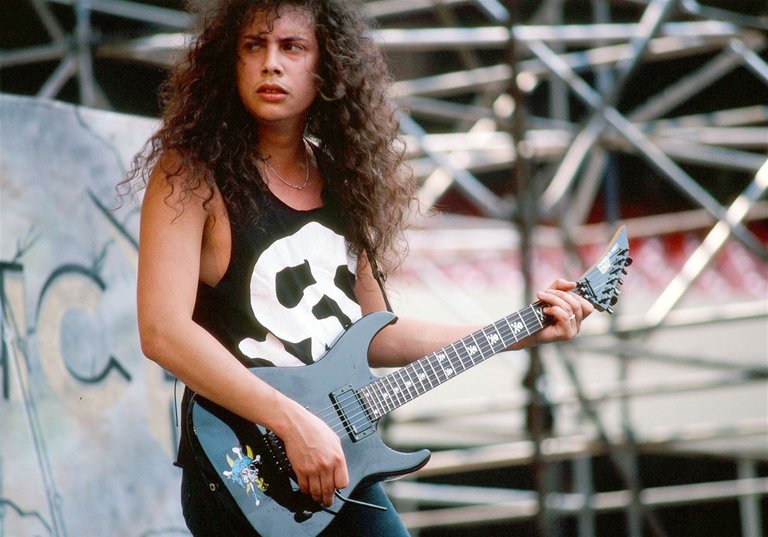
Sin duda que Uno es una canción de contrastes, en la misma se enfrentan de manera prodigiosa los sonidos eléctricos con los acústicos, la melodía con la agresividad, el thrash metal con el rock progresivo, la calma con el ruido, todos, en perfecta armonía entre los constantes cambios de tempo que maneja la canción. Todo esto convierte a Uno en una obra maestra. Como dato curioso, el sonido del bajo es casi imperceptible por no decir inexistente. Este detalle tiene su pequeña historia detrás.
Undoubtedly One is a song of contrasts, in it the electric and acoustic sounds prodigiously confront each other, the melody with the aggressiveness, the thrash metal with the progressive rock, the calm with the noise, all in perfect harmony between the constant changes of tempo that the song manages. All this makes One a masterpiece. As a curious fact, the sound of the bass is almost imperceptible, if not non-existent. This detail has its own little story behind it.
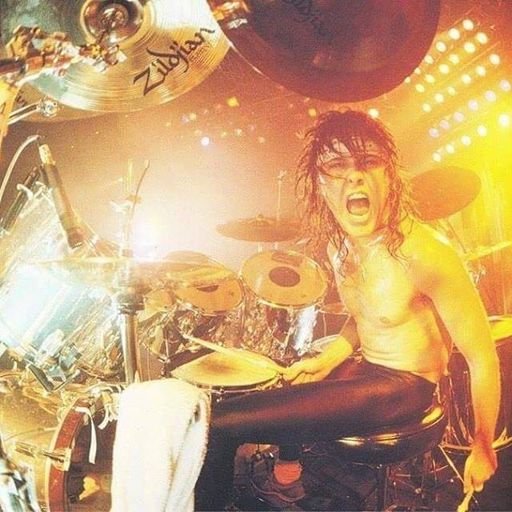
Luego de grabar todas las pistas de …And Justice for All, había llegado el momento de hacer la mezcla, Lars Ulrich le pidió a Steve Thompson, ingeniero encargado de mezclar el disco, que redujera al mínimo el volumen del bajo. Respecto a esto, existen dos teorías sobre lo que lo motivó a tomar esta decisión, una afirma que esto tuvo un trasfondo emocional y que lo hicieron como una forma de respeto hacia Cliff Burton, su bajista fallecido, mientras que según la otra teoría, esto está más relacionado a aspectos técnicos, ya que Jason Newsted, tendía a imitar las líneas de guitarra de Hetfield, lo que hacía muy difícil identificar a cada uno, sobre todo en este disco, donde la guitarra rítmica tiene frecuencias más bajas. Según palabras del baterista: “No fue [un caso de], ´Que se joda este tipo, bajemos su bajo´, era más como ´Estamos mezclando, así que vamos a darnos una palmada en la espalda y subir los ritmos y la batería´. Pero básicamente seguimos subiendo todo lo demás hasta que el bajo desapareció”. Aunque las palabras de Ulrich puedan sonar convincentes, la verdad es que no creo que con Cliff Burton hubiesen hecho lo mismo jajaja.
After recording all the tracks on …And Justice for All, it was time to do the mixing, Lars Ulrich asked Steve Thompson, engineer in charge of mixing the album, to reduce the volume of the bass to a minimum. Regarding this, there are two theories about what motivated him to make this decision, one states that this had an emotional background and that they did it as a form of respect towards Cliff Burton, their deceased bassist, while according to the other theory, this it´s more related to technical aspects, since Jason Newsted tended to imitate Hetfield's guitar lines, which made it very difficult to identify each one, especially on this album, where the rhythm guitar has lower frequencies. In the words of the drummer: “It wasn't [a case of], 'Fuck this guy, let's turn his bass down,' it was more like 'We're mixing, so let's pat ourselves on the back and turn up the beats and the drums. But basically we kept turning everything else up until the bass disappeared.” As convincing as Ulrich's words may sound, I really don't think they would have done the same with Cliff Burton hahaha.
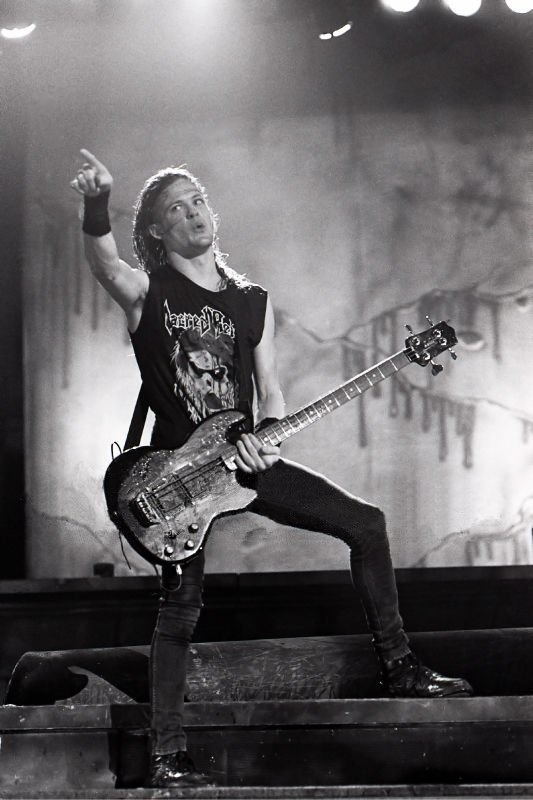
Por otro lado, el productor del disco no quedó conforme con las decisiones de Hetfield y Ulrich, ya que aunque terminó haciendo lo que ellos querían, siempre ha dicho que fue una lástima invisibilizar las líneas de Newsted que sonaban genial y hacían una combinación perfecta con la guitarra de Hetfield, al contrario del sonido de la batería que quedó como Lars lo quería y que según declaraciones del productor, deja mucho que desear. Al final, el disco era de ellos y él solo se dedicó a cumplir sus exigencias. …And Justice for All fue nominado a los Grammy de 1989 en la categoría de “Mejor interpretación de hard rock/metal vocal o instrumental”, donde injustamente y para sorpresa de todos los asistentes, el premio se lo llevó Jethro Tull, este incidente ha sido considerado como uno de los mayores errores en la historia de los Grammy. De hecho, la disquera de Ian Anderson (vocalista de Jethro Tull) y compañía, les sugirió que no fueran a la ceremonia ya que sin duda el premio sería para Metallica.
On the other hand, the producer of the album wasn´t satisfied with the decisions of Hetfield and Ulrich, since although he ended up doing what they wanted, he has always said that it was a shame to make Newsted's lines invisible, which sounded great and made a perfect combination with Hetfield's guitar, contrary to the sound of the drums, which was mixed the way Lars wanted it and which, according to the producer's statements, could have sounded so much better. In the end, it was their album and he only dedicated himself to fulfilling their demands. …And Justice for All was nominated for the 1989 Grammy awards in the category of “Best Hard Rock/Metal Vocal or Instrumental Performance”, where unfairly and to the surprise of all attendees, the award went to Jethro Tull, this incident has been regarded as one of the biggest mistakes in Grammy history. In fact, the label of Ian Anderson (vocalist of Jethro Tull) suggested to them to don´t go to the ceremony since the award would undoubtedly be for Metallica.
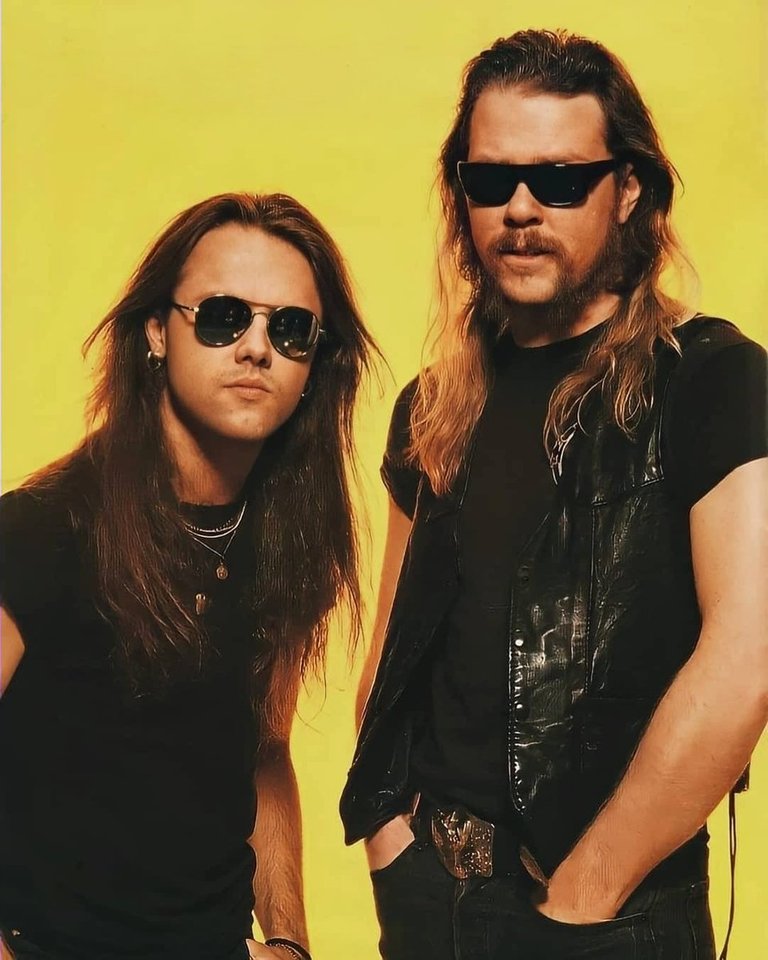
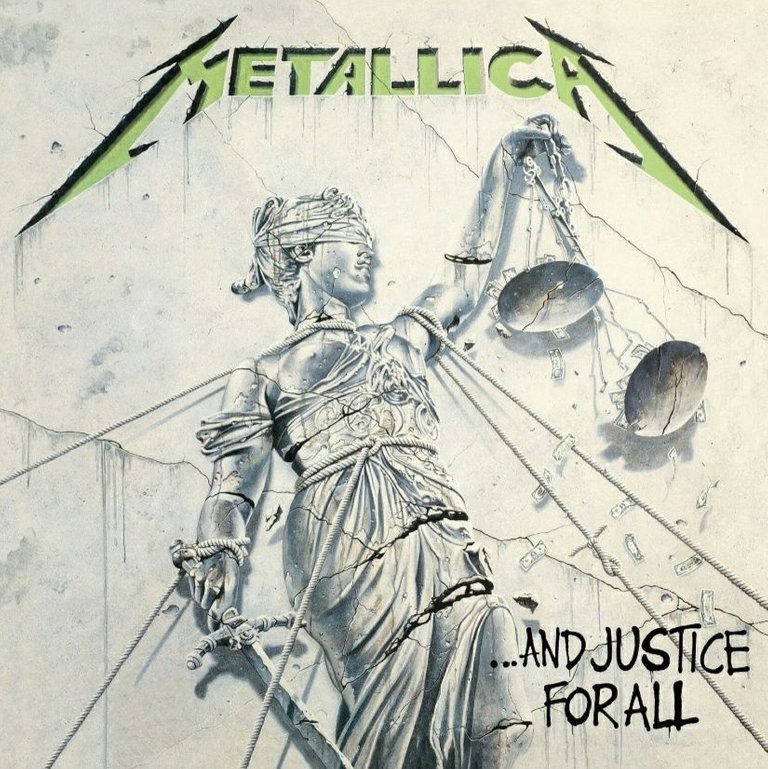
Pasando a la letra de Uno, que es lo que nos trae hasta aquí, se trata de una narración en primera persona de un joven soldado que en pleno campo de batalla de la I Guerra Mundial, pisa una mina, perdiendo en el acto no solo sus cuatro extremidades sino también todos sus sentidos. Es llevado al hospital donde una máquina a la cual está conectado lo mantiene con vida. Cuando el soldado recupera la conciencia, cree que todo lo que vivió ha sido una simple pesadilla pero rápidamente se da cuenta que no puede sentir sus manos, sus piernas, que no puede ver ni escuchar nada. Está vivo pero lo único que sigue intacto es su mente, su cerebro está perfecto y es su peor compañero. Poco a poco empieza a recordar todo, a reflexionar sobre su vida y su mente lo hace revivir todos los horrores de la guerra. Viéndose prisionero de un cuerpo inservible y atormentado por el dolor físico y la idea de tener que pasar el resto de su vida como una especie de “fenómeno”, clama a Dios que acabe con su sufrimiento y lo deje morir. Al no poder hablar, intenta comunicarse en código Morse, golpeando su cabeza contra la almohada, su mensaje es claro, “Mátenme, una y otra vez”.
Moving on to the lyrics of One, which is what brings us here, it is a first-person narration of a young soldier who, in the midst of World War I battlefield, steps on a mine, losing in the act not only his four limbs but also all his senses. He is taken to the hospital and been attached to a machine that keeps him alive. When the soldier regains consciousness, he believes that everything he lived through has been a simple nightmare but he quickly realizes that he can´t feel his hands, his legs, that he can´t see or hear anything. He is alive but the only thing that's still intact is his mind, his brain is perfect and it´s his worst partner. Little by little he begins to remember everything, to reflect on his life and his mind makes him relive all the horrors of the war. Seeing himself imprisoned in a useless body and tormented by physical pain and by the thought of having to spend the rest of his life as some kind of “freak”, he cries out to God to end his suffering and let him die. Unable to speak, he tries to communicate in Morse code banging his head against the pillow, his message is clear: ”Kill me, over and over again”.
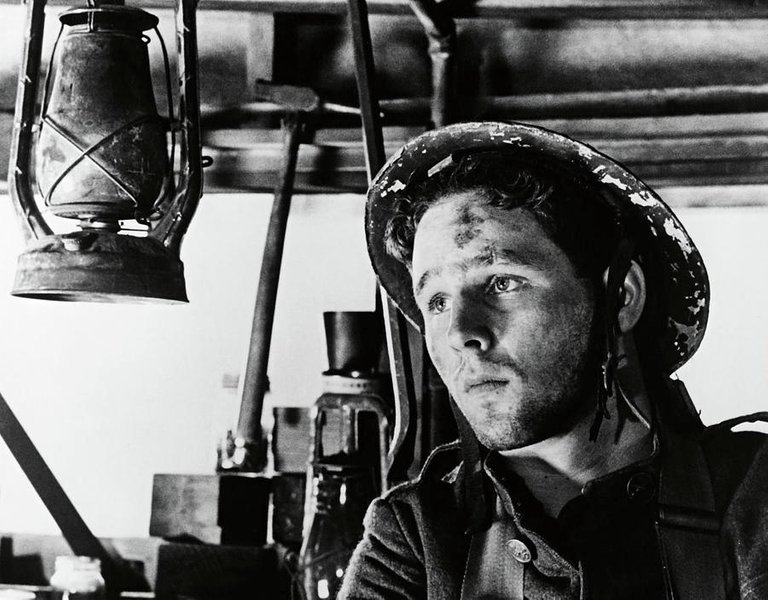
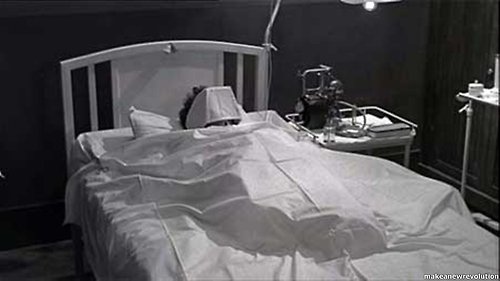
Según James Hetfield en entrevista con David Fricke, con la letra de Uno, se buscaba “La máxima oscuridad, la máxima soledad”. La idea era tratar de reproducir la sensación de sentirse atrapado en la mayor trampa que existe, dentro de uno mismo. La letra llena de agonía y la poderosa parte instrumental con sus cambios de tempo, logran transmitir a quien escucha esta canción esos sentimientos de profunda desesperación, miedo y angustia por los que su protagonista está pasando.
According to James Hetfield in an interview with David Fricke, with the lyrics of One, they were looking for "The maximum darkness, the maximum loneliness". The idea was to try to reproduce the feeling of feeling trapped in the biggest trap that exists, within oneself. The lyrics full of agony and the powerful instrumental part with its tempo changes, manage to convey to those who listen to this song those feelings of deep despair, fear and anguish that its protagonist is going through.
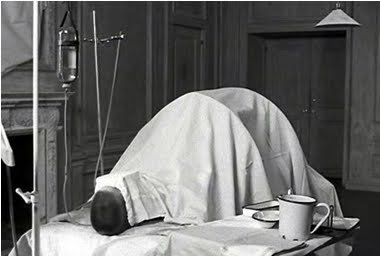
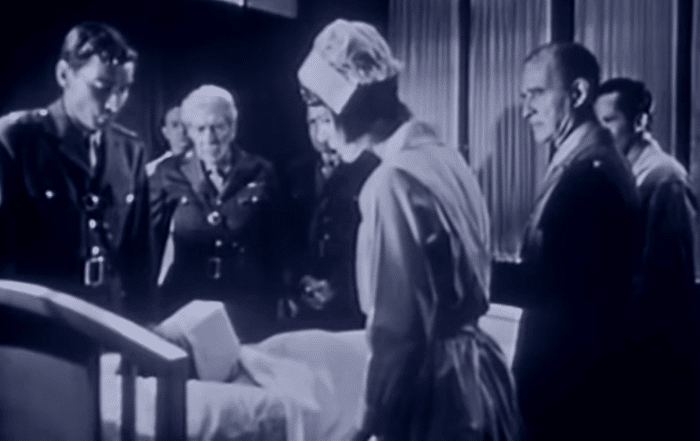
Como ya les expliqué, la letra de Uno está basada en el libro “Johnny tomó su fusil” de Dalton Trumbo. Este libro fue llevado al cine en el año 1971, por el propio Dalton Trumbo, quien escribió el guión adaptándolo para la gran pantalla y también dirigió la película. Aunque Metallica hasta entonces se había negado a hacer videos para promocionar sus canciones, luego de analizar los pros y los contras, decidieron estrenarse en este terreno audiovisual y la canción que eligieron para este nuevo paso fue Uno. Eso sí, la banda quería que su primer video fuese algo creativo y con un mensaje y no solo imágenes sin sentido. Luego de Uno, ya nada sería igual para Metallica.
As I already explained to you, the lyrics of One are based on the book “Johnny took his gun” by Dalton Trumbo. This book was made into a film in 1971 by Dalton Trumbo himself, who wrote the script adapting it for the big screen and also directed the film. Although Metallica until then had refused to make videos to promote their songs, after analyzing the pros and cons, they decided to debut in this audiovisual field and the song they chose for this new step was One. Of course, the band wanted their first video to be something creative and with a message and not just meaningless images. After One, nothing would be the same for Metallica.
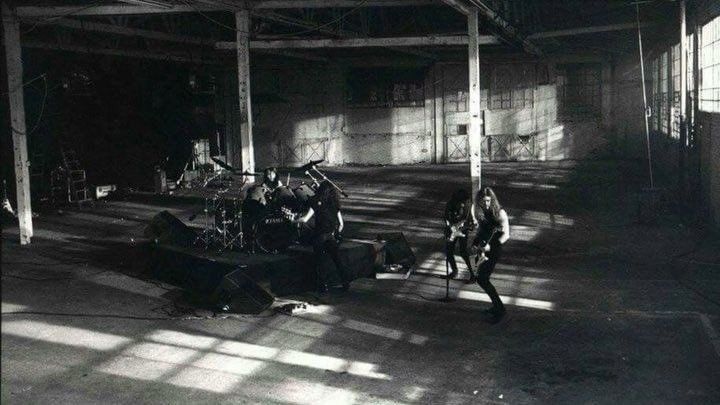
Tomando en cuenta que el libro que inspiró la canción también había sido llevado al cine, decidieron utilizar imágenes y monólogos de la película y complementarlas con planos de la banda tocando en una especie de galpón. Para mantener la oscura atmósfera de la canción, la mayor parte de las escenas están en blanco y negro. Obviamente, cada vez que el video salía al aire Metallica tenía que pagar regalías por las escenas del film así que la banda decidió comprar todos los derechos de la película, lo que a la larga les salio más barato. El video, dirigido por Bill Pope y Michael Salomon, debutó en MTV el 22 de Enero de 1989, alrededor de las 3:30 de la mañana, fue el último video de un programa nocturno de heavy metal que se transmitía en la costa oeste. Según Salomón, director del video: ”Pensé que sería el único lugar de la parrilla en el que la cadena lo pondría, porque era más oscuro de lo normal. Pero, una semana después de que se estrenara, lo pidieron tanto que se comenzó a emitir durante el día, junto a Michael Jackson y Bon Jovi, lo cual fue una gran sorpresa para mí. Afectó mucho a la gente, fue un momento único que nadie podría haber predicho”.
Taking into account that the book that inspired the song had also been made into a movie, they decided to use images and monologues from the film and complement them with shots of the band playing in a kind of abandoned shed. To maintain the dark atmosphere of the song, most of the scenes are in black and white. Obviously, every time the video aired, Metallica had to pay royalties for the scenes in the film, so the band decided to buy all the rights to the film, which was cheaper in the long run. The video, directed by Bill Pope and Michael Salomon, debuted on MTV on January 22, 1989, at around 3:30 a.m. It was the last video for a late-night heavy metal show to air on the West Coast. According to Salomón, director of the video: ”I thought it would be the only place on the grid where the channel would put it, because it was darker than normal. But a week after it was released, it got so much demand that it started airing during the day, alongside Michael Jackson and Bon Jovi, which was a big surprise to me. It affected people a lot, it was a unique moment that no one could have predicted.”
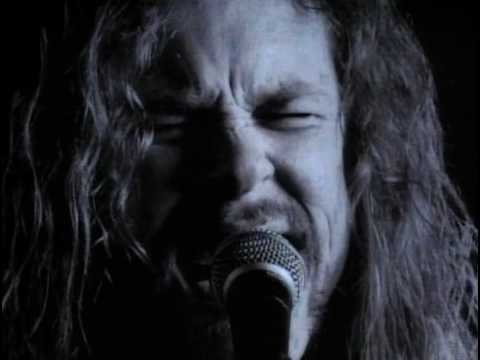
Uno
Letra: James Hetfield y Lars Ulrich
Grupo: Metallica
Disco: …And Justice for All (1988)
No puedo recordar nada
No puedo decir si esto es verdad o es un sueño
En el fondo siento gritar
Este terrible silencio se detiene en mí
Ahora que la guerra ha terminado conmigo
Me estoy despertando, no puedo ver
Que no queda mucho de mí
Ahora nada es real excepto el dolor
Aguanto mi respiración mientras deseo la muerte
Oh Dios por favor, despiértame
De vuelta en el útero es demasiado real
En bombas la vida que debo sentir
Pero no puedo esperar para revelar
Mirar el momento en que viviré
Alimentado a través del tubo que se me clava
Como una novedad en tiempos de guerra
Atado a máquinas que me hacen ser
Corta esta vida lejos de mí
Aguanto mi respiración mientras deseo la muerte
Oh Dios por favor, despiértame
Ahora el mundo se ha ido, solo soy uno
Oh Dios, ayúdame a contener la respiración mientras deseo la muerte
Oh Dios por favor, ayúdame
La oscuridad me aprisiona
Todo lo que veo
Horror absoluto
No puedo vivir
No puedo morir
Atrapado en mi mismo
El cuerpo mi celda de detención
Una mina ha tomado mi vista
Tomado mi habla
Tomado mi audición
Tomado mis brazos
Tomado mis piernas
Tomado mi alma
Me dejó con la vida en el infierno
One
Lyrics: James Hetfield and Lars Ulrich
Band: Metallica
Record: …And Justice for All (1988)
I can't remember anything
Can't tell if this is true or dream
Deep down inside I feel to scream
This terrible silence stops in me
Now that the war is through with me
I'm waking up, I cannot see
That there is not much left of me
Nothing is real but pain now
Hold my breath as I wish for death
Oh please God, wake me
Back in the womb it's much too real
In pumps life that I must feel
But can't look forward to reveal
Look to the time when I'll live
Fed through the tube that sticks in me
Just like a wartime novelty
Tied to machines that make me be
Cut this life off from me
Hold my breath as I wish for death
Oh please God, wake me
Now the world is gone I'm just one
Oh God, help me hold my breath as I wish for death
Oh please God, help me
Darkness imprison me
All that I see
Absolute horror
I cannot live
I cannot die
Trapped in myself
Body my holding cell
Landmine Has taken my sight
Taken my speech
Taken my hearing
Taken my arms
Taken my legs
Taken my soul
Left me with life in hel
Se hicieron tres versiones del video de Uno, la primera versión, que es la más larga, es igual a la del disco y contiene imágenes intercaladas de la banda y la película, la segunda es una versión resumida del video original y la tercera no contiene escenas de la película. Las fuertes imágenes del video, traumatizaron a muchos jóvenes acostumbrados hasta ese momento a los ridículos y superficiales videos del glam rock de los ´80s que dominaban la parrilla de MTV. El éxito del video de Uno hizo que Metallica entrara de lleno en la programación de MTV y a partir de allí la banda se transformó en una de las más importantes del rock pesado. Uno ganó el Grammy en 1990 como “Mejor interpretación de metal”. Así mismo, ayudó a que otras bandas del género fuesen tomadas en cuenta por el famoso canal de música. Si bien sus seguidores más acérrimos vieron como una traición el hecho de que grabaran un video, para el grupo significó una gran oportunidad de dar a conocer su música y con el tiempo llegar a consolidar una larga y exitosa carrera hasta nuestros días.
Three versions of the One video were made, the first version, which is the longest, is the same as the one on the album and contains interspersed images of the band and the movie, the second is a summarized version of the original video and the third doesn´t contain scenes from the movie. The hard images of the video traumatized many young people accustomed until that moment to the ridiculous and superficial glam rock videos of the '80s that dominated the MTV grid. The success of the One video made Metallica fully enter the MTV programming and from there the band became one of the most important in heavy rock. One won the Grammy in 1990 for “Best Metal Performance”. Likewise, it helped other bands of the genre to be taken into account by the famous music channel. Although their most staunch followers saw the fact that they recorded a video as a betrayal, for the group it meant a great opportunity to make their music known and eventually consolidate a long and successful career to this day.
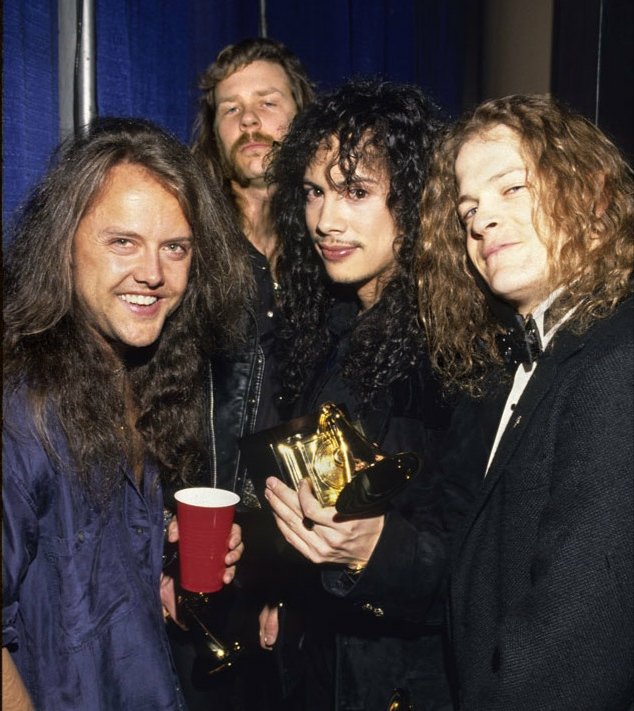
Uno es una de mis canciones favoritas de Metallica, creo que es la que más me gusta. Los cambios de tempo, el solo y la parte donde Kirk y Lars simulan una ametralladora con sus instrumentos, bueno, que más puedo decir que, sencillamente genial. La primera vez que vi este video quedé realmente impresionada, me pareció muy perturbador, en ese momento no sabía de qué trataba la canción pero el impacto visual de las imágenes y la música fueron suficientes para hacerme entender que no se trataba de algo muy agradable. Las palabras de Lars Ulrich respecto al video lo dicen todo: ”Obviamente no es el video más alegre y edificante que se pueda ver. Definitivamente consigue una reacción algo emocional. No había visto un video de esa naturaleza antes”. Se que luego de leer esta publicación, muchos querrán leer el libro y ver la película, no se que tan fácil sea encontrar el libro pero la película está disponible en YouTube, tanto en su idioma original (inglés) como subtitulada al español, realmente vale la pena verla. Es una película muy fuerte y perturbadora pero con un contundente mensaje contra la guerra que nos invita a reflexionar.
One is one of my favorite Metallica songs, I think it's the one I like the most. The tempo changes, the solo and the part where Kirk and Lars simulate a machine gun with their instruments, well, what else can I say, just great. The first time I saw this video I was really impressed, I found it very disturbing, at that time I didn't know what the song was about but the visual impact of the images and the music were enough to make me understand that it wasn't very nice story. Lars Ulrich's words regarding the video say it all: ”Obviously it's not the happiest and most uplifting video you can see. It definitely gets a somewhat emotional reaction. I hadn't seen a video like that before.” I know that after reading this post, many will want to read the book and watch the movie, I don't know how easy it´s to find the book but the movie is available on YouTube, both in its original language (English) and subtitled in Spanish, it´s really worth seeing. It´s a very hard and disturbing movie but with a strong message against the war that invites us to reflect.
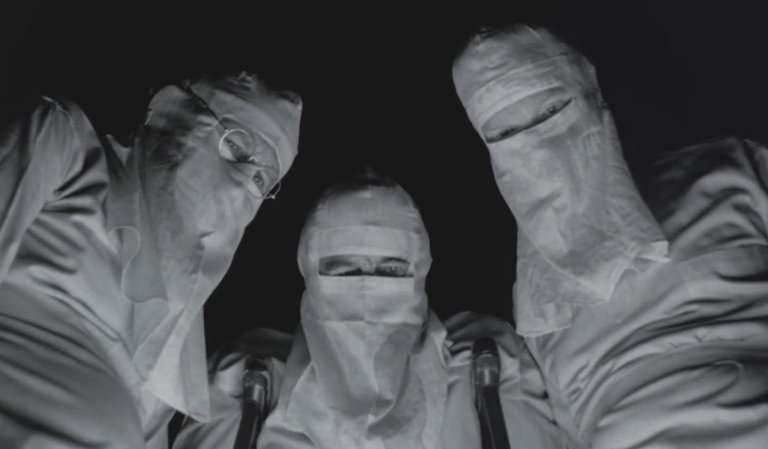
Bueno amigos, hasta aquí esta edición de Las Letras del Rock, espero que les haya gustado y que hoy sepan un poquito más que lo que sabían ayer. El rock nos hace vivir y experimentar diferentes sensaciones y yo estoy aquí para guiarlos por todos esos viajes. Y recuerden, amor y paz y NO A LA GUERRA.
Well friends, so far this edition of The Lyrics of Rock, I hope you liked it and I hope that today you all know a little more you knew yesterday. Rock music makes us live and experience different sensations and I am here to guide you through all those trips. And remember, love and peace and NO WAR.
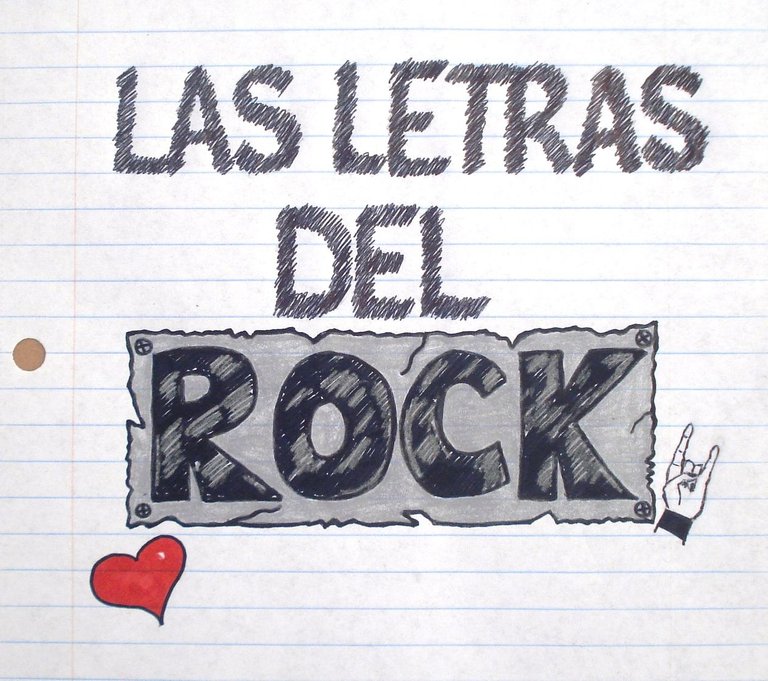
Si te gusta el rock y quieres leer las otras ediciones de Las Letras del Rock, te invito a darle click a los enlaces. Y si me quieres seguir, únete que lo mejor está por venir.
If you like rock music and you want to read past posts of The Lyrics of Rock, I invite you to click on the links. And if you want to follow me, join, the best is yet to come.
Enlaces / Links:
Gracias por leer, compartir, apoyar, votar y comentar.
Hasta la próxima.
¡Miau!
Thanks for read, share, vote and comment.
Until next post.
Meow!
¡Espectacular post como siempre! Recuerdo el impacto que me causó ese video, sin duda cualquiera queda perturbado con esta historia...
😁 muchas gracias! 😁Me alegra que te haya gustado. Si, muy perturbadora historia, una contundente crítica a las consecuencias de la guerra que al final los que las sufren son las personas y no los que las inician. 🤘😺